- Home
- DeFelice, Jim
Hogs #3 Fort Apache Page 9
Hogs #3 Fort Apache Read online
Page 9
The Hogs were designed for battlefield maintenance. Rosen had to hand it to the engineers for keeping things very basic. But it was also true that her skeleton crew of Jimmy, Elephant and most of all the Tinman were the best crew-dog technical expert ground wizards in the Air Force. The fact that the Capo had put her in charge of the operation made her determined to bust twenty more guts than normal; she was good and damned if she wasn’t going to be better.
So if the truth be told, when the two Devil ships came back to base looking like they’d spent the day in an auto dealer showroom, she was a little disappointed. It wasn’t that she was looking for something to do. They were going to be here for a while and had a ton of organizing to do, not to mention the fact that their talents could always be used helping the base detachment with other planes. It was just that she felt like there ought to be something more challenging.
And, since she’d heard that Lieutenant Dixon had been assigned to this mission, she was more than a little disappointed he hadn’t shown up.
Which was part of the reason she went to report the detachment status to Captain Glenon personally. Glenon and Captain O’Rourke were still debriefing in the makeshift intelligence area, a sandbagged tarp not far from the runway.
“Captain, just wanted you to know, both Hogs are good to go.”
“Jesus. We landed ten minutes ago,” said Glenon. He seemed annoyed. Rosen was used to that, having dealt with the squadron’s DO, Major “Mongoose” Johnson, a world class ball-buster.
Still, they’d just busted their butts getting the planes ready. She’d worked with Glenon a few times and never had any trouble with him before; for an officer, he’d seemed all right. But that was then, and this was now. Stinking officers were all the same.
“I’m sorry if you expected them sooner, sir,” she said, her lips pressed together tightly.
“No, that wasn’t what I meant. Relax, Sergeant.”
“Relax, sir?”
“Yeah, you don’t have to kill yourself,” said the captain. “We won’t be flying until tomorrow morning.”
“Speak for yourself,” said A-Bomb. “I was thinking of going camel hunting.”
Rosen recognized that that was supposed to be a joke. She laughed politely, and looked back at Glenon. All right, so he was okay. For an officer. Short guy, all muscle, quick temper, but okay. Kind of guy you could trust.
“The planes will be ready the second you want them, sir.”
“Okay. Get some sleep or food or whatever.”
“Thank you, sir,” said Rosen, but she didn’t move.
“Something up?” asked Glenon.
“Oh, um, nothing sir, just— I was wondering about Lieutenant Dixon.”
“Dixon? What about him?”
“I hadn’t seen him, but I heard he was assigned to this mission.”
“BJ’s uptown with the commandos,” said A-Bomb. “Crazy fuck parachuted down with them last night. They went out at like 35,000 feet— you believe that?”
Rosen nodded and stepped back to let the men pass. She felt her side stitch up, as if she had been running for a half-hour. She massaged it gently, but knew it wasn’t going away.
CHAPTER 22
AL JOUF FOA, SAUDI ARABIA
25 JANUARY 1991
1920
“You want to drum up a card game after dinner?” A-Bomb asked Doberman as they walked from the briefing area.
“Nah,” said Doberman. He was feeling tired and a little beat-up from the two long runs north. “I’m just going to bed.”
“Bed? Shit, are you kidding me? Bed? Instead of cards?”
“Screw off.”
“Oh man, you’re making a big mistake,” insisted A-Bomb. “I’m tellin’ ya, that cross of Tinman’s gonna be hot-shit at the poker table.”
“I’d be careful about playing cards with these Special Ops types if I were you,” said Doberman. “You win too much they may bury you in the desert.”
“Yo, look who’s here,” said A-Bomb, spotting Wong walking toward them. “Hey Braniac, where’s the food at?”
“Food. Right,” said Wong.
“Seriously, there a place where we can get something to eat?” Doberman asked.
“There are several, though I wouldn’t advise any of them. Before you eat, Colonel Klee wants to see you.”
“What’s up?”
Doberman listened with disbelief to the scheme to drop fuel for the helicopters.
“That’s impossible,” said Doberman.
“Merely difficult,” said Wong. “If it were easy they wouldn’t be interested.”
“How’s that air strip coming?” asked A-Bomb. “You think we can use it soon?”.
“Don’t be crazy,” Doberman told his wingman. “It’s just about in Baghdad.”
“Baghdad is quite a distance away,” said Wong. “Given the layout of the Iraqi defenses as well as their overly centralized command structure, the base might as well be in Riyadh. This is a classic outgrowth of the Soviet philosophy, the inherent flaws that were first pointed out by Herman Dedorf in his 1951 report and subsequently demonstrated by a little-known project entitled–”
“Spare me the dissertation,” said Doberman. “No matter where it is, a thousand feet isn’t long enough to land anything. Let alone take off.”
“Shit, Dog, that’s doable,” said A-Bomb. “What do you say, Braniac?”
Wong seemed not to understand why he had suddenly been nicknamed after a character in the Superman adventures. But it didn’t prevent him from spewing forth.
“They wish to double the length and land C-130s there. That will require considerable work and earth-moving equipment, a most inefficacious contingency though they seem undeterred by such considerations,” the captain told them. “If they can achieve that, then by all means your planes could operate there was well, assuming reduced weights and combat schemes. In fact, with the modest extensions to the present configuration that are already planned, the Fort Apache strip would be theoretically accessible to an A-10A, as you already undoubtedly are aware.”
To Doberman, Wong sounded like a kid on a quiz show who wouldn’t shut up. And A-Bomb egged him on, bobbing his head up and down like a toy on a dashboard.
“If you operated at forward combat weight of approximately 32,771 pounds, you would need just 1,450 feet to take off,” continued Wong. “Of course, there are several contingencies, including the wind and, in Captain O’Rourke’s case, how much candy he happens to be chewing at the time.”
“And whether I got the stereo cranked,” said A-Bomb, grinning.
“But the idea of placing American warplanes so far behind the lines where they would be open to a concerted ground attack is itself insane,” said Wong.
“Thank you,” said Doberman.
“It’s not that crazy,” A-Bomb told Doberman after they finally managed to get Wong to point them in the colonel’s direction. “If we could refuel there we wouldn’t have to go home every time the AWACS calls out a snap vector. Shit, we’re flying so goddamn far north as it is, what difference is landing going to make?”
“Strip’s only a thousand feet,” said Doberman.
“Yeah, but Wong said they’re extended.”
“Wong.”
“Guy’s a brain, Dog Man. He’s the world’s expert on Russian weapons.”
“And what does that have to do with lengthening airstrips?”
“Hey, you look at him, you say: there’s a guy who knows concrete.”
“Only because he’s going to end up buried in some.”
Even though the idea of landing a Hog two hundred miles deep in Iraq sounded crazy, Doberman realized that there was a certain logic to the insanity. It would immensely increase their time on station— hell, they would always be on station. And while the actual bomb runs were no picnic, the most perilous part of their missions were actually the long legs to and fro. Flying high made them immune to triple-A, but if the wrong SAM site picked the wrong second to come on li
ne, a dozen Weasels couldn’t take out the radar quickly enough to protect them. Even the old SA-2s— flying telephone poles which had been around since Vietnam— were potent weapons against a slow, heavily laden Hog. And a Roland or SA-6— forget about it.
So Doberman didn’t immediately punch A-Bomb when he mentioned using Apache to the colonel in the command bunker.
Actually, the reason he didn’t had more to do with the fact that A-Bomb was across the room.
Even the Special Ops colonel could tell landing the Hogs at Apache was crazy. His mouth and cheek worked up and down, as if he’d gotten something caught in one of his back teeth.
“You know, son, I used to fly Hueys up Ho Chi Ming’s butt,” he said finally. “You don’t have to impress me.”
“I’m not pushing a permanent Home Drome,” said A-Bomb. “What I’m talking about is a fuel depot, and maybe get some gun dragons up there, load up the cannon between shows. Dump in a few hundred iron bombs while we’re at it. Nothing big. That’s what I’m talking about.”
The colonel gave Doberman a look that said, he’s crazy, right.
Doberman shrugged. Klee turned back to A-Bomb.
“You boys just do this fuel drop tonight, all right? We’re going to be goddamn lucky to have it work,” said the colonel.
“Excuse me, colonel, can I get a word in here?” said Doberman.
“I wish you would, Captain.”
“I’m not saying we can’t do this, assuming those tanks don’t explode when we drop them.”
“They tell me they won’t,” said Colonel Klee. “We’ve made similar drops from MC-130s. Assuming your people rig them right.”
“If they can be rigged, our guys will do it,” said Doberman.
“Then it’s in your court.”
Doberman clamped his teeth together, trying to choke back his bile. He didn’t like being treated like a flunky. The colonel’s dismissal of the problems involved in the mission was, in his mind, reckless.
But it was difficult for him to say that without exploding.
“Damn straight it’s in our court,” he finally managed. “Damn straight. We’re going to do a kick-ass job and you can count on it. But realistically, Colonel, realistically we’re not equipped for night fighting. Our navigation systems are not exactly state of the art. This drop has to have a pretty wide margin of error. Unless we use flares, we’ll be bombing blind.”
“No flares,” said Klee. “We’ll live with whatever margin of error you give us.”
“Skull and I used Maverick G’s when we rode up and grabbed Goose,” said A-Bomb. “If we can round up a couple of those suckers, we’ll be able to see the ground at least.”
“Get them,” said the colonel. “If you have to put X-ray machines in those planes, do it. But nothing that gives the helicopters away before they get there.”
Doberman blew another long breath, this one calm enough to exist through his mouth without rattling his teeth. He told himself he was just pissed about the colonel’s personality, which wasn’t an important thing to be pissed about.
The gig was impossible, but what the hell. They’d done harder shit. As long as it was him and A-Bomb taking it, they’d figure something out. And if it weren’t for the fact that Dixon’s neck was on the block up north, he wouldn’t give a flying turd’s crap what happened to this jerk-ass of a colonel’s command. If he wanted to risk stranding two helicopters so deep in Iraq that it took the entire Army and Air Force and maybe the Marines to rescue them, what the hell.
“When are the helos taking off?” A-Bomb asked.
The colonel glanced at his watch. “They should be in the air by now. They’re refueling at the border. According to Wong’s timetable, they needed a good head start. You have a little over three hours to meet them. You miss them, don’t bother coming back.”
CHAPTER 23
ON THE GROUND IN IRAQ
25 JANUARY 1991
1920
It was Leteri who realized the ground between the two hills was mined. Something about the neatness of it tipped him off just in time to grab Dixon’s arm and yank him physically backwards.
“Stop!” yelled the sergeant. “Everyone freeze right where you are.”
He didn’t use the word “mines.” He didn’t have to.
Winston and Green were nearly twenty yards deep in the minefield, which lay below the sheer rock of the old quarry. Staffa Turk was five yards behind Dixon, himself maybe seven or eight yards deep. The others were stretched out in a jagged line either ahead or over toward the road on the rocks, apparently safe.
Maybe. It was fairly dark and difficult to tell.
“What we’re going to do is go back exactly the way we came in,” Winston told the others. He pulled the flashlight from his vest; the others did the same. “We’re going to do it one person at a time, and we’re going to move slowly no matter what happens. Turk, you go, then the Lieutenant. Use your lights to check the marks on the ground. Watch for mine nubs, if you can.”
It seemed to take forever for the Trooper to back out. Finally, he shouted for Dixon to come.
Dixon had only the roughest idea of where he had stepped. He started to turn. Leteri yelled at him to stop.
“Exactly the way you came, BJ. Backwards if you can. Lean back with your right foot. That was the step you took.” He directed him with his light. “I can tell by the way you’re standing. See that mark there?”
“You’re right. Thanks.” He put his leg backwards, trying to pretend he was a character in a rewinding video. He found a foothold, shifted his weight, and took the backwards step. Whether he had found the exact footfall or just got lucky, nothing happened.
Three more steps and he was still intact. It would take four or five more to reach the boundary, where large boulders strewn on the gentle slope showed they’d be safe.
Probably.
“Go as slow as you want, Lieutenant,” said Winston. “No rushing here.”
Dixon flexed his upper leg muscles and studied the ground. He resisted the dash back to the line that was supposed to mean safety, tried to remember how he had walked, and saw the shadow of a boot print.
Or was it the top of a mine?
He moved his foot at the last second, planted, moved back another step, then another.
When he was finally far enough away, he let the com gear and his ruck sack slide off his back in a heap. Dixon rolled his head backwards on his neck and let out a breath of air so huge he nearly fell over.
Leteri came back next. Only Green and Winston were left. Green was ahead of Winston but the team leader insisted that he come back first.
“Just do what I fucking tell you to do,” he growled when Green protested. “Can’t you hear I’m getting hoarse?”
Dutifully, the medic began to retrace his steps. The arc he had followed took him near Winston’s position; they exchange a sardonic glance as he passed. Green took a step back, then rested, flexing as much as he could without moving his feet. He was about ten yards, no more, from safety, near where Dixon had been.
Practically home.
He took another step back, and exploded.
CHAPTER 24
ON THE GROUND IN IRAQ
25 JANUARY 1991
1927
It was a movie he was watching. The camera panned back from a wide shot, moving away from the brief flash and burst of dirt. Two dark bodies jumped against the dull shadows behind them, one twisting forward in a macabre dance, the other falling straight over from the side, like a tree axed by a woodsman. As the dust and smoke settled into the twilight, a figure ran toward the dancer. Its steps were awkward and fitful, as if following an unheard music score.
The camera view changed, zooming on the second body, closing in on the sand-colored motley of his uniform, the odd shapes of brown and yellow and tan blurring as the lens momentarily lost focus. The camera swirled, and then showed the ground, hard-pressed dirt and sand galloping by in an artistic effect, pitching in a way that made
him slightly seasick, and seemed at the same time to weigh down on his back.
Finally the lens fell on a black boot stained with a spatter of blood brighter than the red of a spring poppy plant. It stayed there for a moment, drinking in the color and finely lined pattern, then moved to another spot of red, another perfect splotch, this one on a dull yellow and black fabric. The camera moved forward and the fabric was revealed to be an arm, the hand gripping something tightly, its long, slender fingers curled so tightly the small veins popped greenish-blue against the knuckles.
And then the camera moved back again, beginning a pan as its movement stopped; something fell slowly through the frame, another body, the same body the shot had begun with. The lens moved up and found a thick, pained face, creased with lines and the stubble of a day-old beard. The mouth moved with a groan or a curse; it was impossible to say.
###
“Green’s dead,” said Leteri, still huffing.
Turk was leaning over Winston. “Don’t talk, Sarge. Let me get this around your leg.”
Winston’s protest contorted into a groan as Turk pulled the bandage around the open wound. Bits of muscle and gore splayed out; Dixon saw what he thought was the thigh bone, white gray amid the sea of blood.
“He’s trying to tell you that was a stupid thing, running into the minefield,” Leteri told Dixon.
“If I only did smart things I wouldn’t be here,” said Dixon.
Turk rolled Winston onto his side. The back of his uniform was already dark with blood.
“We’re gonna have to look at this real careful,” said Turk.
Dixon realized the others were looking at him, expecting him to say something, even if it was the most obvious thing.
Which was?
“We’re exposed here,” Leteri said. “Let’s find some cover.”

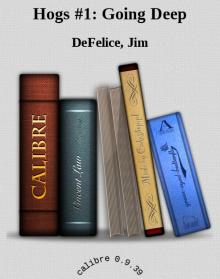 Hogs #1: Going Deep
Hogs #1: Going Deep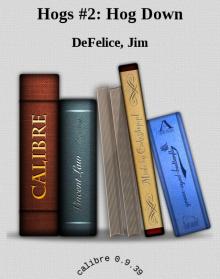 Hogs #2: Hog Down
Hogs #2: Hog Down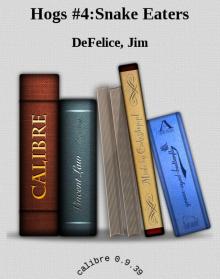 Hogs #4:Snake Eaters
Hogs #4:Snake Eaters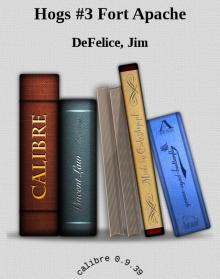 Hogs #3 Fort Apache
Hogs #3 Fort Apache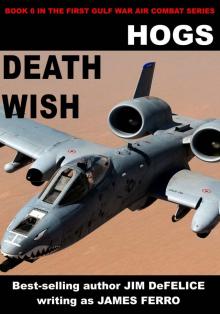 HOGS #6 Death Wish (Jim DeFelice’s HOGS First Gulf War series)
HOGS #6 Death Wish (Jim DeFelice’s HOGS First Gulf War series)